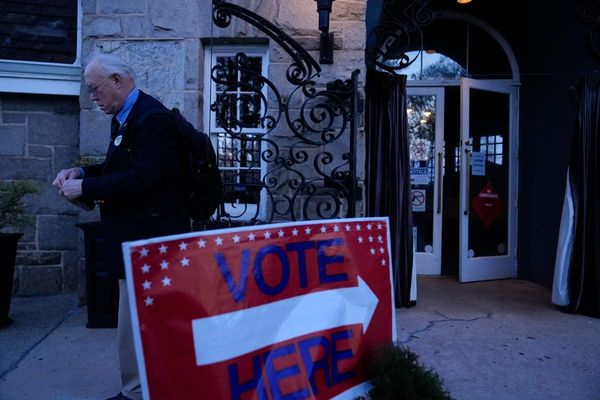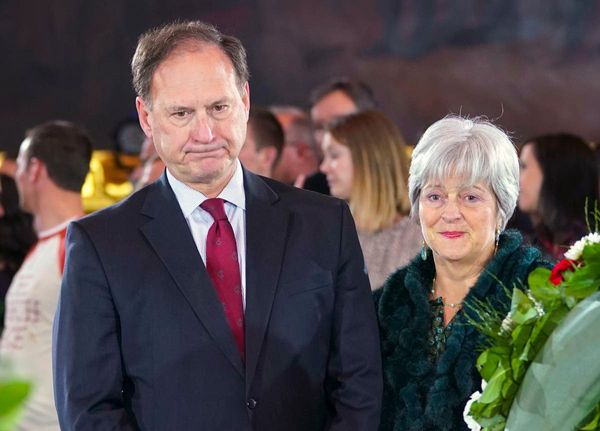
The old Fran Mills would have ignored a group of boozed-up blokes hurling obscenities in her direction. The 28-year-old actor, born with achondroplasia, the most common form of dwarfism, had a mantra for situations like these. “If a stranger is pointing or staring or videoing me,” she says, “or blokes are making rude or lewd remarks, I tell myself: ‘It’s their problem, not mine – rise above it.’ I don’t have the energy or capacity to engage. Or, in all honesty, the confidence. So I act like I can’t hear or see it.”
This was her plan when, a few nights ago, a crowd of men started ogling and lobbing crude remarks her way on the streets of London’s Soho. Mills was out with friends for the evening. “They must have been on a pub crawl,” she recalls. “Some of them noticed me and kept making comments as if I didn’t understand English. It turned sexual – remarks about how good I’d be in bed.” The vulgar machismo kept on coming: explicit, offensive, disrespectful. “It’s stuff I’ve heard before. Usually, I’d walk the opposite way. But this time, much to my own surprise, I found myself following them.”
Mills moved closer to the men and stared them down. Even when she was obviously in earshot the abuse was unrelenting. Coolly, she walked right up to the pack, “and in the lower end of my vocal register, I found myself saying: ‘You do know I can hear everything coming out of your mouths?’ Their faces were aghast. I realised I was calm and in control, so I carried on: ‘What do you think you’re playing at saying those disgusting things? Do you have sisters? Daughters?’” Apologies were immediately forthcoming from some, but “others at the back were a little slower, saying things like ‘Oh my God, it speaks.’ Still, I came away from it so galvanised and empowered. Even if I only impacted half of that group, my hope is the next time it happens, those ones will have a word with their dickhead mates. Maybe it’ll make them think. I would never have done that before all this – before the Duchess.”
Since February, Mills has been playing the title role in the Jacobean tragedy The Duchess of Malfi at the Sam Wanamaker Playhouse, inside Shakespeare’s Globe in London. It’s her third production at the theatre and the job that has provided the motivation behind this newfound confidence and conviction. We’re meeting in the stalls of the intimate, 340-capacity auditorium, sitting together on a midweek morning. In black Dr Martens, cream cut-off jeans and a vintage Burberry coat, Mills proves a natural storyteller without script and period costume.
“The play takes place over 10 years,” she explains. “The Duchess grows up through it. At the start, she’s naive to how cruel the world is. Men in power don’t want her to have wings and fly, to be independent and make her own choices. The Duchess falls in love with a man of lower class, building a life with him against her brothers’ wishes. A quiet radical, she refuses to be placed in the box society wants to put her in.” She is enthralling in the role. The show opens with a slick dance number; Mills conducts the court with seductive choreography. It ends with a slightly more macabre set-piece: the Duchess is strangled to death on stage, on the order of her brothers, and Mills must lie still, before walking off, a ghost. “Even until her last breaths,” she suggests, “she has fight in her. The Duchess goes down in flames, not whimpering.”
Playing the Duchess has felt personally defining to her. “It has shaped me,” she says. “I’m instinctively very much a ‘hello, don’t-mind-me, sorry-for-existing’ kind of person – someone who quietly sits in the corner. But the Duchess isn’t afraid to ask for what she wants. To take up space. To be sexy and own her needs.” Working with a voice coach through rehearsals felt formative. “I realised in my life I tend to go higher pitch as I talk, as if embarrassed to be heard: ‘Sorry, sorry, sorry.’ The Duchess goes deep into her breath and asks for what she wants. As Fran, there was something scary about taking up that much space. Before this, I just wouldn’t have said anything to those men on the street. But the Duchess orbits around men telling her what to do, and she stands up to them, bold and defiant. What I did was the result of sitting with this character since January. I might not have this confidence for ever. But I would be lying if I didn’t say I was rather proud of myself for standing up and saying: ‘Really, fuck you lot.’”
Mills is best known as an actor. She has appeared in Harlots, the British 18th-century brothel-based period drama, and Netflix’s The Witcher: Blood Origin, as well as in a string of successful stage shows. Later this year she’ll become a series regular in BBC’s much-beloved Silent Witness. At heart, though, Mills is a dancer, happiest while in motion. She started young, at a dance school just down the road from her family home in rural Shropshire. “I’d go there after school for baby ballet. As I got a little older, the lessons were almost every night: jazz, tap, contemporary, more ballet. I’d come home from school, scoff a honey sandwich, then dance for hours and hours.” Endless rehearsals installed in her the ability to focus, alongside what she believes to be quite evident health benefits. “Many people with achondroplasia have to have lots of operations when they’re younger: on their spine, on their legs,” she explains. “Being in ballet, telling my body as it was growing to be more upright and being in control of my posture, influenced, I think, why I never had to have operations for those things as a kid. It also offered me an awareness of my body from a young age. I was never ashamed of or apologetic for it.”
Throughout her childhood, Mills was raised to understand her height was no limitation. “I’m the youngest of three siblings,” she says. “My mum, dad and sister are tall. Me and my brother, who is five years older than me, are both small.” Having an older brother with achondroplasia meant everything felt possible for her. Take the transition from quaint village primary to sprawling secondary. “I arrived looking very different to most kids, but I was always just Millsy’s little sister. The school buildings were already adapted. He did the hard graft, so I could breeze through. And because he’d done it all, I wasn’t treated like a fragile piece of glass, teachers didn’t wrap me in cotton wool. It was assumed I’d just get on with things. To this day, I love when people expect more from me; are rougher with me. I want to be treated like everyone else, even if it means I get trampled on.”
At some point in her early teens, Mills was forced to confront an uncomfortable reality. “I went from truly believing I could make it as a professional dancer to swallowing that someone of my height wouldn’t be accepted into the Royal Ballet.” Aware of the need to diversify, she joined a local drama club. “I do think I’m an actor now,” she says, “but I hope in every show there’ll be a dance routine. When they asked how high I wanted the heels for the opening number in The Duchess of Malfi, I requested a stonking platform to mince around in like a Shetland pony. I want people to go: ‘Oh, I didn’t know little people could move like that, dance in heels that high.’ Even if I do go arse over tit occasionally.”
Mills landed her first professional gig at 16, as one of the seven dwarves in a Mansfield Snow White pantomime. “I did a whole Christmas season,” she says, “and I did have fun being young, living away from home, getting paid. But as soon as I’d started, I knew I wouldn’t do it again. I wanted to perform, but this wasn’t the answer. The audience reaction when a group of seven little people walked on stage? No matter how much I tried to act or make a character arc, the script was only there to make a joke of little people.” She had a similar experience when cast on a TV prank show. “I had to climb out of a laundrette’s tumble dryer in front of members of the public on a hidden camera show, as if I’d been drying off from the rain. As a comedy actor, I wanted to nail it. Now I look back and think: were they laughing at my acting or just the fact I’m a little person? There were only a handful of jobs I could go in for, so I did. I took what I could. You live and learn, I guess.”
A year later Mills was cast in a stage version of See How They Run, a 1940s farce. It was a completely different experience. Produced by Warwick Davis’s Reduced Height Theatre Company, the cast were all under 4ft tall. “He’d never seen little people in a play where [their height] wasn’t central to their parts,” she says of Davis. “So he did it himself” – created his own theatre company – “exposing this brilliant talent in the industry.” The show toured the UK for a number of months. “For us as a cast, being around only little people was fairly normal. But it was important for audiences. After a few minutes, they’d enjoy the plot for what it was. They’d watch us for our acting.”
At 18, Mills auditioned for drama school. She applied for musical theatre programmes, but found she was offered, instead, straight acting courses. “So I declined,” she says, “and moved to London at 19 to make it happen on my own.” She’s been living in the capital since. “I played Tinkerbell in pantomime a few years on the trot. Flying around like a fluorescent cupcake was fun, in a big blonde Dolly Parton wig.” Through her teens, she was made to believe dance and musical theatre wasn’t for her. By 20, she’d been cast in A Pacifist’s Guide to the War on Cancer at the National Theatre, an all-singing, all-dancing London musical. “To 18-year-old Fran, the [musical theatre] dream was dead in the water.” And now? “Now it doesn’t feel off the cards that I could lead a musical myself in the West End. It’s why exposure is so important: Rose Ayling-Ellis and Ellie Simmonds on Strictly Come Dancing; Amy Trigg, a wheelchair-user, being Olivier-nominated for The Little Big Things. We’ve a long way to go, but in 10 years I’ve seen this shift happen. So much feels possible.”
Of all the parts that have come her way, the most unexpected are those she’s played at the Globe. “For a long time I ran only towards comedy parts,” she says, “so I could beat people to the punchline. I’d make them laugh, so they’re not laughing at me. In no world did I think I could do Shakespeare. And I’d never trained for it.” In 2018, she was cast in The Two Noble Kinsmen, another Jacobean classic. “Doing that,” she says, “I realised I liked to, and I could, play more serious and dramatic parts. That I don’t always have to play comedy.” Last summer, she returned to the Globe to play Hermia in A Midsummer Night’s Dream. “You can’t apologise for coming on and saying the lines with Shakespeare, whereas in comedy you can blurt it out, be self-effacing. Here, you have to walk on, stand firm and announce…” She drops into that deep voice once more. “‘I am here, this is what I have to say.’ It’s why I keep coming back to it.”
That’s not to say, she’s keen to add, that these roles don’t offer up fresh challenges. “Convincing an audience I’m being murdered on stage in real time has been wild,” she says, smiling now. “Is it bad to say I enjoy the drama of it all? And then I have to lie there still onstage, all puffed out, convincing people I’m dead for 10 minutes. Controlling my breathing is harder than the whole track of the Duchess. I end up light-headed.” The other night, Mills forgot she was playing a corpse. “I went to lick my lips, and halfway through realised I was dead. Very slowly, I had to pull my tongue back in. Mostly, it’s tricky to stop myself thinking about my Lidl shop, but then I’d miss my cue when briefly resurrected.”
Mills has already proved that so much of what once felt professionally out of reach is, in fact, hers for the taking. “It has been five steps forward, four steps back,” she says, “but these last few weeks, for the first time, something feels different. With my height, growing up I genuinely thought panto was as far as I could get. Ten years ago my aspiration was Snow White on a Disney cruise ship. And I was happy with that. I didn’t even know that was limiting. It took a lot of people that came before me – fighting, putting their foot down – for me to be able to do all this.” She gestures up to the stage above us. “Maybe it’s the Duchess still in my skin, but now I look to the future and just see possibilities. And that’s so exciting.”
The Duchess of Malfi runs until 14 April at the Sam Wanamaker Playhouse, Shakespeare’s Globe, London
Styling by Emma Lane; photographer’s assistant Alistair Mc Veigh; hair and makeup by Vale Von Der Wehl; shot on locations at Shakespeare’s Globe







